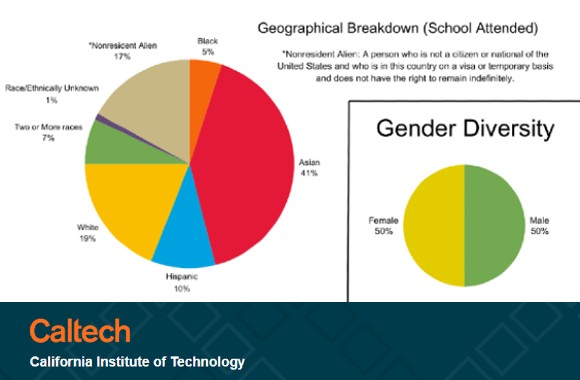
Scholar responds: ‘Diversity by sex is a poor proxy for the actual viewpoint diversity that makes a college flourish’
The California Institute of Technology’s incoming class is 50 percent female for the first time in history, sparking concern from one legal expert about a focus on gender parity initiatives rather than merit.
A profile of the undergraduate class of 2028 highlights the students’ “gender diversity,” showing 50 percent of the students are male and 50 percent are female. The profile also breaks down the class by students’ race, financial aid awards, and home state or country.
“As one of the leading research and education institutions, we aim to recruit, enroll, and develop the world’s most talented students,” spokesperson Robert Perkins told The College Fix in a recent email.
“These students come from all backgrounds and communities, and it is in bringing together exceedingly bright, curious, creative, STEM-passionate problem-solvers that science, engineering, technology, and society advance,” Perkins said.
The private research university described the class gender demographics as a “historic milestone” in an article earlier this month on its website.
Caltech has been “pilot[ing] strategic initiatives” such as “targeted outreach and recruitment efforts” to increase the number of female attendees, according to the article.
These efforts are critical in order to “combat inequities” and “increase diversity among the undergraduate class,” the institution states.
However, a former Department of Education assistant secretary in the Trump administration has concerns about the legality of Caltech’s efforts.
“Gender parity initiatives are usually unjust because they tend to involve disparate treatment and disparate impact on the basis of sex,” Adam Kissel, a visiting fellow at the Heritage Foundation, told The Fix.
According to Title IX, “No person in the United States shall, on the basis of sex, be excluded from participation in, be denied the benefits of, or be subjected to discrimination under any education program or activity receiving Federal financial assistance.”
“Disparate treatment and intentional disparate impact in university recruitment of students are even more clearly unlawful following the Students for Fair Admission opinions from the Supreme Court,” Kissel said in a recent email to The Fix.
The 2023 ruling shot down Harvard and University of North Carolina at Chapel Hill’s race-based admission system on the grounds of the Equal Protection Clause of the Fourteenth Amendment.
The Caltech Equity and Title IX Office states on its website that the institute’s “policies and procedures against unlawful discrimination and harassment, sex- and gender-based misconduct, and related retaliation comply with important state and federal anti-discrimination laws, including Title IX of the Education Amendments of 1972.”
Yet, Kissel said the issue with gender parity initiatives extends beyond legal reasons.
He said they “nudge other people to pursue studies they are not actually cut out for” and “disrespect women’s choices and try to get girls and women to do things they do not already want to do, in order to achieve social goals.”
Furthermore, despite Caltech reporting a lower graduation rate for men, the institute puts an emphasis on supporting the success of female students “via academic and career counseling” and “mental health resources.”
The university also offers 10 affinity groups specifically for women, but none are listed for male students.
Kissel said these kinds of gender parity initiatives “almost always seek to lift up women at the expense of men, while the same institutions tend to express no interest in supporting men when they are underrepresented.”
The Caltech media relations office did not answer The Fix’s questions about the legality and fairness of its gender diversity initiatives.
But its spokesperson, Perkins, told The Fix that the institute’s admissions office “furthers the Institute’s commitment to research and education by ensuring that the best and brightest STEM students know Caltech and that they are aware of the opportunities that our collaborative, interdisciplinary research and education community provides.”
He told The Fix the admissions office also works to foster “greater awareness” of the college to prospective students.
“[A]nd once students matriculate, our campus community is committed to and invested in the success of all enrolled students while they are at Caltech and beyond,” he said.
But Kissel said that “diversity by sex is a poor proxy for the actual viewpoint diversity that makes a college flourish.”
“Diversity initiatives for the sake of counting identity groups are more of a socialist redistribution exercise or a project in cultural division than a genuine effort to bring diverse views into academic discussion,” he told The Fix.
With the rise of the transgender movement, Kissel said some universities that have gender parity goals and initiatives “might be hard pressed to define what a woman is in the first place.”
At the bottom of Caltech’s article celebrating the incoming class’s gender diversity, a disclaimer reads: “Admissions data reflects students’ ‘legal sex’ per national reporting requirements. Students are not required to report their gender identity on college applications, so admissions data may not accurately reflect students’ lived genders.”
MORE: Group alleges MIT rejects male applicants for less-qualified female ones
IMAGE: fizkes72/Shutterstock, California Institute of Technology
Like The College Fix on Facebook / Follow us on Twitter






Please join the conversation about our stories on Facebook, Twitter, Instagram, Reddit, MeWe, Rumble, Gab, Minds and Gettr.